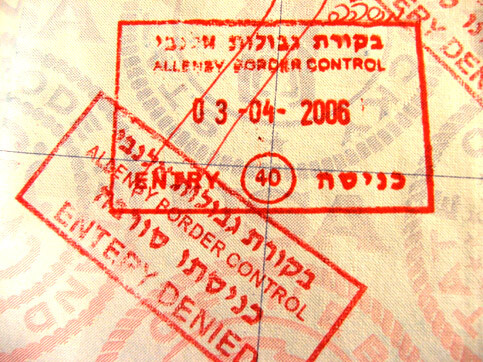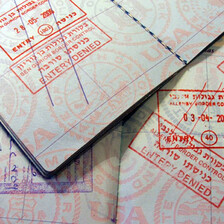
(Image: Maureen Clare Murphy)
They move from the lobby to the terrace, from the Internet to the phone all day long. The couple leave for a bit, and then come back, sit for a while in the lobby and then go to their room, and back again for a little walk.
I thought they were Iraqis, like the many other families in the Amman, Jordan hotel where I am staying. Iraqi families now constitute most of the hotel clientele. Some come for a few days for medical reasons - like Souma, who curses the American occupation for destroying her country and making her “drive for ten hours to get a check-up, when Iraq was once known for its medical services.” Some stay in Amman for good, fleeing the sectarian conflict - they also “put the responsibility on the American occupation.”
“Are you also from Iraq?” I ask the aforementioned restless couple.
“We are Palestinians. We have been stuck here for almost two months waiting for a permit to go to Ramallah, where we spend most of our time since our retirement.” They talk with bitterness, cursing yet another occupation for not allowing them into their homeland.
The situation of Laura and Ibrahim is just one of many created by the latest Israeli policy to cleanse Palestine of Palestinians. As their lawyers told them, “The Israeli government wants the least number of Palestinians in the Palestinian territories.” In mid-August, they left Ramallah for Amman, thinking it would be for just a few days, in order to renew their three-month visas to stay legally in Israeli-occupied Ramallah. Their daughter was visiting them in Palestine from the US, and she stayed behind, waiting for them to come back so she could spend the last two weeks of her summer vacation with them. But when they arrived at Tel Aviv Airport, they were detained for a night.
Laura explains, “We arrived at the airport and we were asked to stay aside. An officer approached us and started to pepper us with questions. We never encountered such a treatment before. I was given a visa since I have an Egyptian passport. In other words, I am an Egyptian-American not a Palestinian-American. Ibrahim was made to wait for two hours and then he was told he was denied entry. When Ibrahim came to me, the officer realized we were together, and she snatched the passport from me and said, ‘You are together? Oh, then you can’t enter either.’ So she denied me entry too. We were told that we are lucky that there were seats in the next day’s flight back to Jordan!”
Ibrahim and Laura thought they would stay in the airport until the next day, but then the officer said, “No, you can’t stay in the airport here, you will be taken to a place where you spend the night.”
“They allowed us to get our pajamas and toothbrush and a change of clothes for the day after. We were then put in a military vehicle and were driven to the immigration jail where we spent the night, and were driven the day after to the airport and back to Amman, where we have been for almost two months waiting for mercy from the new rulers of the world.”
In Amman, Laura and Ibrahim tried to contact the American Embassy, since they are American citizens and thought the embassy should do something for them. The embassy told them, “We just take care of Jordanian-Americans; we have nothing to do with Palestinian-Americans, you need to contact the consulate in Jerusalem. They are responsible for you.”
According to the couple, “We knew it was a good way of telling us, ‘We are not going to help you and we are not going to anger the Israeli government.’ We contacted a lawyer in Jerusalem who started to work to help us get back. One day he called to ask if we had a Palestinian Authority ID. We thought this would help. He said, ‘No, it is better if you do not have it! I want to assure the authorities here that you do not have an ID.’”
Ibrahim was suprised and asked the lawyer why that was. The lawyer responded, “Well, the government wants to make sure that there will be less Palestinians in the Palestinian Territories, they are costing us so much money you know.” Ibrahim was angry but of course all that he wanted was a permit so he assured the lawyer they had no Palestinian identity cards, and that they just came for a few months to stay Ramallah and then go back to the US for the rest of the year where they stay with their children and where they have a house and property. The laywer was able to secure a one week entry in the beginning of the September at the cost of two thousand dollars.
The couple said they would go and see from there. When they reached the Allenby bridge crossing into the West Bank, they said, “We were treated like criminals, with officers shouting at us, and giving us orders.” After seven hours of waiting, Ibrahim was allowed a week, and Laura was told to return to Amman along with many other Palestinian-Americans. Ibrahim is now back in Amman, after his week-long visa expired. They are still waiting for a solution to this dilemma, waiting to be allowed entry to their homeland in Ramallah, where they live in their 100-year old-house.
“Is not that enough to prove I have a right to be there, that I have a home that I inherited from my great-great-grandparents?” Ibrahim asks. Then he remembers, “Oh, I should not have said that, this might be used against me — Palestine does not need more Palestinians.”
Ibrahim grew up in Ramallah and went to high school there. He then went to Egypt, married Laura, and they both moved to the US. After securing a US passport, they came back to live in Palestine in 1985 and stayed until 1989 when Israel’s brutal response to the Palestinian intifada made it impossible for their children to go to school regularly. In 1998, Ibrahim moved back to Ramallah, where his youngest daughter attended high school.
“I just do not feel myself away from Ramallah. I can’t breathe away from Ramallah! The air there is different, it makes me feel alive. It is home for me. Is it too much for us to live where we feel at home?”
Ibrahim and Laura did not apply for a Palestinian identity card, thinking that they did not need it. The American passport allows for more rights and it protects us more, they thought. Besides, they wanted to spare the IDs for people who did not have other identities at a time when the Israeli government allowed the Palestinian Authority only a certain number of IDs.
“It does not seem the American passport helps if you are of Palestinian origin,” says Laura tearfully, remembering the criminal treatment they were subjected to at the airport and the bridge.
Laura and Ibrahim, along with many others, are still waiting for the American administration to act and protect the rights of its citizens and deal with them as such, without discrimination for being of Palestinian origin. They might need to wait a long time, but they won’t give up their right to return to where “the air is different,” to their home in Ramallah.
Mayssoun Sukarieh, a native of Beirut, is a frequent contributor to Electronic Lebanon
Related Links





